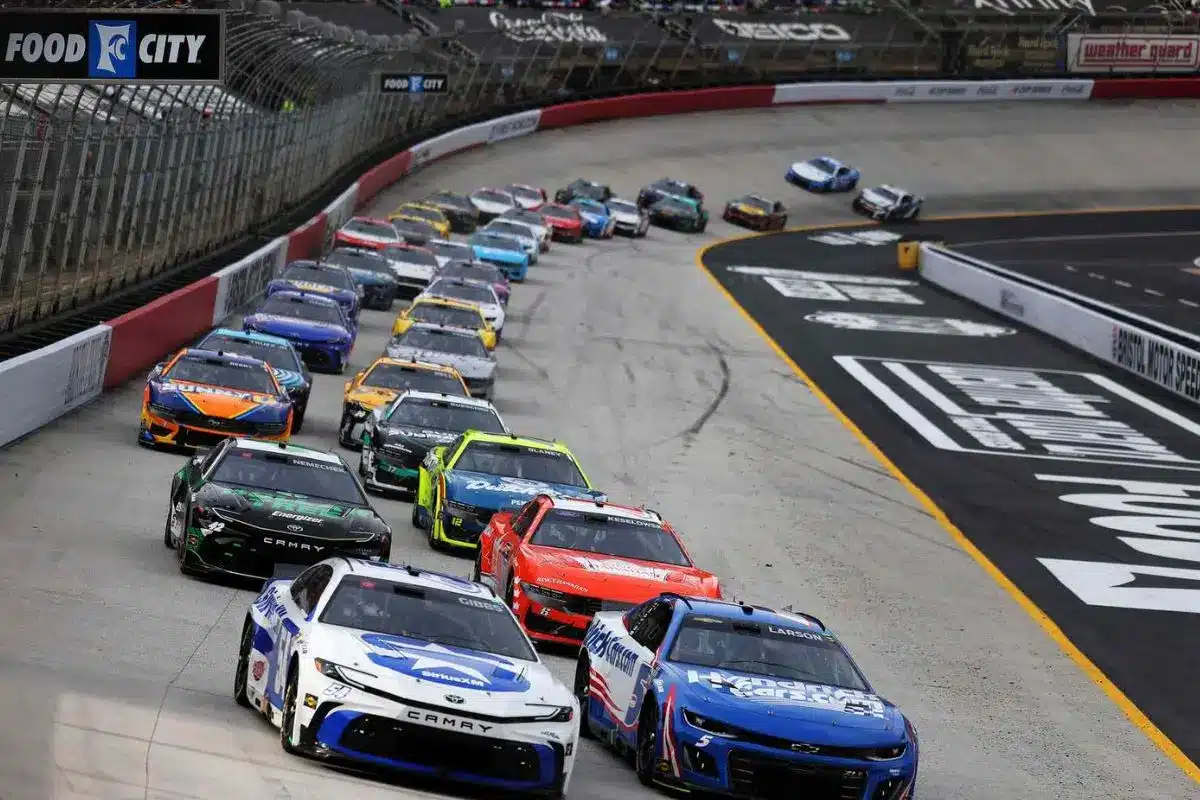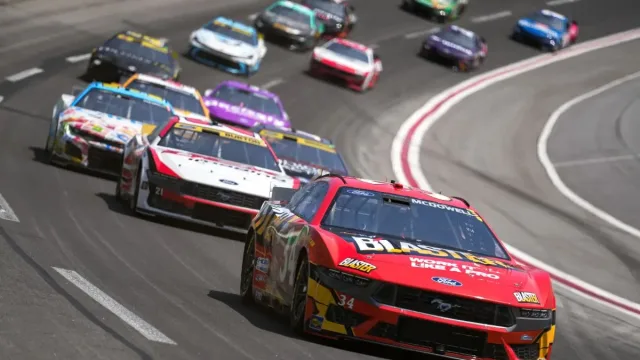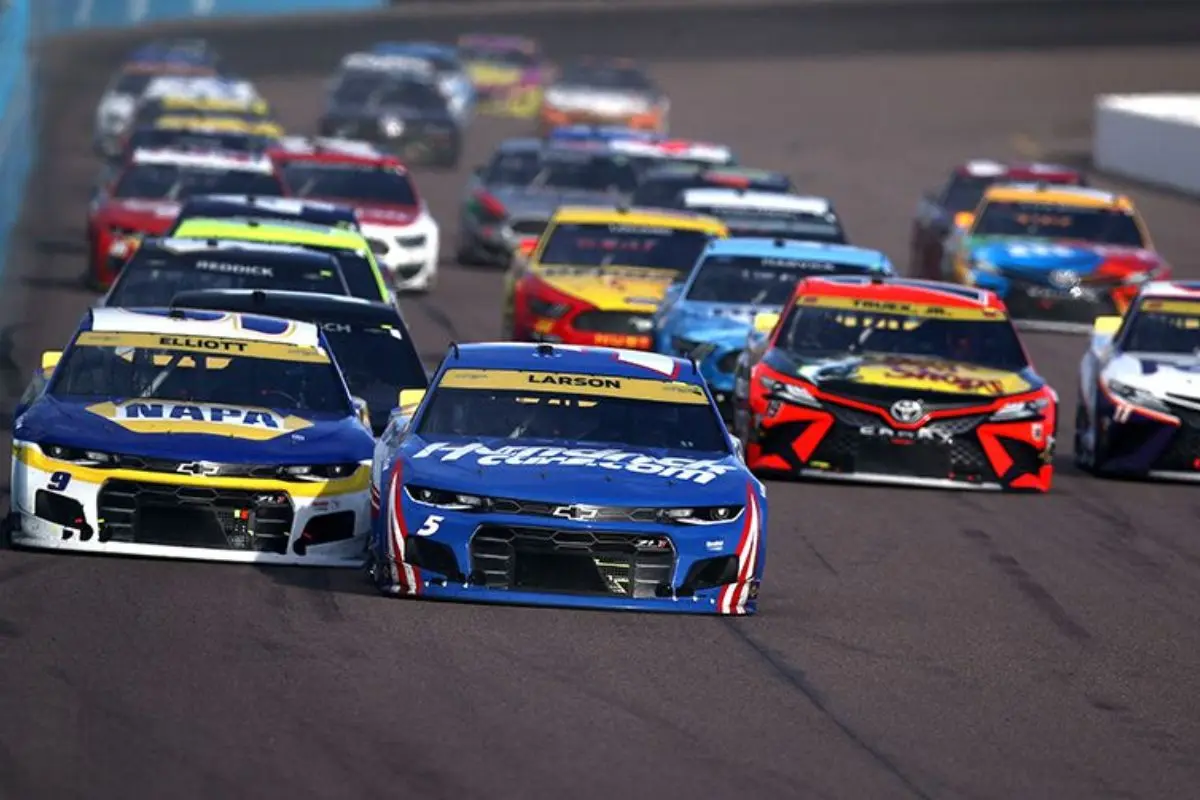NASCAR’s Shady Charter Deal Unmasked as it has been under examination for allegedly prioritizing larger teams at the expense of smaller ones. By allocating nearly half of the substantial $7.7 billion media revenue to team owners, the arrangement creates a financial imbalance that some believe stifles competition. The recent anti-trust lawsuit filed by Michael Jordan’s team highlights these tensions, challenging the perceived favoritism within the charter system. This situation could reshape competitive dynamics in NASCAR, revealing deeper implications for the sport’s future.
Key Highlights
- NASCAR’s charter proposal allocates nearly half of TV revenue to team owners, potentially favoring larger teams with more resources.
- Smaller teams like 23XI Racing and Front Row Motorsports opted out of the proposal, highlighting divisions within the sport.
- The anti-trust lawsuit filed by 23XI Racing challenges the perceived favoritism in NASCAR’s charter system, seeking competitive equity.
- Rick Hendrick’s endorsement of the deal indicates that some team owners see financial incentives as a path to sustainability.
- Legal challenges and polarized reactions reveal underlying instability and governance issues within NASCAR’s competitive landscape.
Anticipation for the NASCAR Championship Amid Legal Distractions
As anticipation for the NASCAR Championship builds, a notable shift in focus has emerged, intertwining the excitement of the race with the legal circumstances surrounding Michael Jordan. This year, the championship race at Phoenix Raceway is set to be more than just a competition for the Bill France Cup.
Traditionally, the lead-up to the championship revolves around race strategy, driver performance, and betting odds. However, the legal proceedings involving Jordan have overshadowed these discussions, shifting the narrative and drawing attention to broader issues within NASCAR. As one of the sport’s most high-profile figures, Jordan’s legal entanglements are not merely personal. They resonate within the NASCAR community, prompting stakeholders to reconsider the implications for team ownership and economic equity.
The intersection of Jordan’s legal challenges with the championship narrative raises questions about the stability and governance of NASCAR. The focus on Jordan’s case reveals an undercurrent of concern regarding the future landscape of NASCAR.
In this climate, the excitement surrounding the championship is tempered by a sense of uncertainty.
NASCAR Attorney Reveals Financial Terms in Charter Proposal
Details surrounding NASCAR’s charter proposal have ultimately come to surface, revealing significant financial implications for team owners. The recent disclosure by NASCAR’s attorney, Christopher Yates, in court has clarified the proposal’s revenue-sharing terms, which are crucial in shaping the future competitive landscape of the sport.
This proposal, delivered just before the opening playoff race in Atlanta, included an ultimatum for teams to accept by midnight, coupled with conditions that would limit NASCAR’s future legal liabilities.
Chris Yates, attorney from the @LathamWatkins law firm representing @NASCAR, said that teams under the new charter agreement are to get "nearly half of the TV revenue — that is not a small amount by any metric."
— Adam Stern (@A_S12) November 4, 2024
Central to the proposal is the allocation of “nearly half of the TV revenue,” a staggering incentive made possible by NASCAR’s lucrative $7.7 billion media deal with major networks, including NBC, Fox, Amazon, and Warner Bros Discovery, covering the years 2025 to 2031.
Significantly, teams like Michael Jordan’s 23XI Racing and Bob Jenkins’ Front Row Motorsports opted out, reflecting a divide among team owners regarding the perceived fairness and long-term implications of the charter system.
As larger teams benefit disproportionately from these revenue streams, the potential for a widening gap between big and small teams looms, posing challenges for the integrity and competitiveness of NASCAR racing as a whole.
Mixed Reactions from Team Owners on NASCAR’s Charter Proposal
NASCAR’s charter proposal has elicited a spectrum of responses from team owners, reflecting the complex dynamics at play within the sport. The reaction among team owners has been particularly polarized, with some expressing cautious optimism while others remain skeptical of the long-term implications of the deal.
An anonymous team owner revealed that, despite initial reservations, the promised revenue increase was compelling enough to justify acceptance of the proposal. This sentiment echoes among numerous stakeholders who recognize the immediate financial benefits.
Rick Hendrick, NASCAR’s most successful team owner, characterized the charter deal as fair, emphasizing that it offers necessary protections for charters while ensuring a revenue enhancement. His endorsement carries considerable weight, potentially swaying opinions among other owners who may be reticent to fully adopt the proposal.
“I felt it was a fair deal, and we protected the charters, which was number one, we got the (revenue) increase.” – RICK HENDRICK
The disclosure of financial terms by attorney Christopher Yates has reframed the conversation surrounding the charter system.
Michael Jordan’s Lawsuit Pushes for Major Changes in NASCAR
Seeking to challenge the existing power dynamics within NASCAR, Michael Jordan’s co-owned 23XI Racing, alongside Front Row Motorsports, has initiated an anti-trust lawsuit that could catalyze substantial changes in the sport.
Attorney Jim Kessler has articulated a willingness to investigate the ‘open’ racing category should their preliminary injunction be denied, indicating a shift in strategy that could disrupt traditional hierarchies.
“They have been calling NASCAR a series of names that undermine NASCAR’s brand and goodwill. NASCAR only wants to enter into charter agreements with teams who want to work collectively to grow the sport.”- CHRISTOPHER YATES
NASCAR’s response, articulated by attorney Christopher Yates, suggests a dismissive stance toward the lawsuit, advocating for the teams to race under open conditions as they have historically. However, this belies the deeper implications of the lawsuit, which could redefine competitive equity in the sport.
The outcome of this case hinges on Judge Frank Whitney’s forthcoming verdict, which could either reinforce existing structures or pave the way for groundbreaking changes.
Both parties radiate confidence, yet the stakes are high: a decision in favor of the plaintiffs could dismantle monopolistic protections and usher in a new era of NASCAR, one that prioritizes fairness and opportunity for all teams, regardless of size.

News in Brief: NASCAR’s Shady Charter Deal Unmasked
The examination of NASCAR’s charter system reveals substantial disparities that favor larger teams at the expense of smaller competitors. The ongoing legal challenges, particularly the lawsuit initiated by Michael Jordan, underscore the urgent need for reform within the organization. A thorough analysis of the financial structures and stakeholder reactions demonstrates the complexities inherent in the current charter proposal. Ultimately, addressing these inequities is essential for nurturing a more competitive and fair racing environment.
ALSO READ: “What a Dumb***”: Fans Rage Against NASCAR’s VP After Controversial Playoff Decisions


